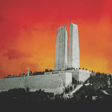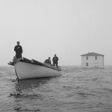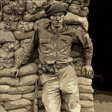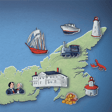Emotional Legacy of Confederation and Civil War
00:00:03
Speaker
Confederation is a civil war. The South never forgot the civil war. The people in Newfoundland never forgot the Confederation Battle. Everybody had an opinion. I mean, some people actually argued about it and thought about it. And there were people who left home in a rage and slammed the doors. I presume they reconciled with their families afterwards. But it was really emotional.
1948: Decision of Independence or Joining Canada
00:00:32
Speaker
In 1948, the people in the British colony of Newfoundland faced a choice. They could become an independent country within the British Commonwealth, or they could vote to join Canada in Confederation. St. John's was an anti-Confederate headquarters. Bishop O'Reilly in Cornerbrook, an Irishman himself, was very pro-Confederate.
00:00:58
Speaker
I remember my father saying that Canadians were just a mirroring with the varnish rubbed off. How did the debate go down? Who was for independence? Who was in favor of joining Canada? And did Newfoundlanders make the right decision? This is Stories Behind the History.
Introduction to Newfoundland's History and Confederation Anniversary
00:01:20
Speaker
Welcome to Stories Behind the History. I'm Kate Jamit, Senior Editor of Canada's History Magazine.
00:01:26
Speaker
In this podcast, I speak with leading historians and witnesses to history to discover the people and events that shaped our nation. The year 2024 marks the 75th anniversary of Newfoundland joining Canada. It happened on March 31, 1949, after months of passionate debate and an extremely close vote.
Interview with Newfoundland Figures on Pre-Confederation Memories
00:01:49
Speaker
There are people in Newfoundland and Labrador today who remember when it was still a British colony and who lived through the referendum on Confederation.
00:01:58
Speaker
For this special series of episodes, I travelled to St. John's Newfoundland to interview former Premier Clyde Wells, best-selling author Bernice Morgan, artist Kathleen Knowling and former federal MP Richard Cashin about their memories of pre-confederation Newfoundland and to ask them if they think Newfoundlanders made the right choice when they joined Canada.
00:02:24
Speaker
You've gone to request that you remain seated with your seatbelt securely fastened until the captain has turned off that seatbelt sign and it is safe to stand on your feet.
00:02:33
Speaker
On behalf of the Porter team, we thank you for playing with us. We wish you a wonderful evening here at Snowy St. John's.
Exploring Newfoundland in the 1930s and 1940s
00:02:40
Speaker
It was just before Christmas when I visited St. John's and the city looked just like it does in all the postcards with the steep and slippery snow covered streets lined with colorful wooden houses, the big ships in the harbour and on the other side of the harbour a rocky hill covered with evergreens.
00:02:56
Speaker
Before I jumped into the Confederation debate, I wanted to find out what Newfoundland was like in the 1930s and 1940s, the years leading up to the referendum.
Clyde Wells on Early 20th Century Newfoundland Life
00:03:12
Speaker
My name is Clyde Wells.
00:03:17
Speaker
I was born in the center of the island of Newfoundland in a small community called Buckins Junction. But most of my earlier life was at stations along the railway line because my father worked with a railroad and we lived in Bishops Falls and ultimately in 1944 we moved to Stephenville Crossing on the West Coast. We weren't landed gentry or anything and didn't
00:03:45
Speaker
no family wealth or anything of that. My father, he didn't earn very much money. I'm the second eldest of nine children. My father had found a means of building his own house by going in the woods and cutting the logs and floating them down the river, getting a saw miller to saw them by sharing half with the mill for doing it and the other half and out of it he built our house. So we weren't
00:04:16
Speaker
didn't grow up with a silver spoon. So they were difficult and challenging times.
Transportation Challenges in 1949 Newfoundland
00:04:25
Speaker
Clyde Wells explained to me that because the British colony of Newfoundland had originated as a fishing station in the North Atlantic, the island's population of about 300,000 people was scattered along the coastline and on near shore islands in more than a thousand small communities. You may not have noticed.
00:04:47
Speaker
Newfoundland has no counties. In Newfoundland, we operated on bays. So you had an address, Greenspawn, Trinity Bay, Basin George, Notre Dame Bay. And the transportation, there were no roads at all in 1949. The transportation was by coastal boat. The railway ran a coastal boat service all around. So in addition to operating the railway, the railway company had the responsibility
00:05:15
Speaker
provide transportation to all the bays and food stuff, some freight for all of these communities that weren't connected. So there weren't many roads, and those were really mostly horse carts. If you got outside Cornerbrook, Grand Falls, and St. John's, St. John's was the only city in that state. Outside those three, there was not ten miles of pavement in the entire territory.
Bernice Morgan on St. John's During the Great Depression
00:05:51
Speaker
The depression of the 1930s hit these small outport communities hard. Looking to escape from poverty, many people moved into St. John's.
00:06:01
Speaker
My name is Bernice Morgan. I was born here in St. John's, where I'm still living. I was born in 1935, February the 8th. And my parents, my father from Random Island, my mother from Cape Island, Bonavista North, fishing community, lumbering community, came into St. John's during the Depression, young people, to work. I had read a book. It said that there are only two big kinds of people in St. John's.
00:06:31
Speaker
They're very extremely rich and extremely poor. And that's not true. There was a working class and that's what we were. We had a nice two-story house. We were never hungry. We didn't have a car. We didn't have any money to spend on luxuries, but we were well-fed and well-clothed.
00:06:50
Speaker
Do you remember when you were smaller, did you think of yourself as being a Newfoundlander? Did you think of yourself as being part of the British Empire? How did people see themselves?
Cultural Affinity with the British Empire
00:07:01
Speaker
Oh, we were very much a part of the British Empire, especially in St. John's. Almost everything imported came from England. Anything good, English tweed, English suits, English coal.
00:07:15
Speaker
was better than anything you could get from Canada. It was better made, the cold burnt better. The war came and our people joined up. I had uncles in the Navy, British Navy. And the flags were the Union Jack, we sang God Save the King. I could still tear up singing There'll Always Be an England. Yes, yes. We were very, very British here, certainly in St. John's.
Social Divide in St. John's
00:07:56
Speaker
Bernice Morgan mentioned that even during the Depression there were poor people and rich people in St. John's. Among those considered rich were a handful of merchant families. My name is Kathleen Leo Knowling. I was born on December the 10th, 1927. I was born in St. John's.
00:08:17
Speaker
and my family owned a department store, air and sun. We were fortunate and now my mother was an excellent manager but we were also fortunate because my father had a regular job and in local terms it was a very good job because he was a director of the family business.
00:08:36
Speaker
Outside of Newfoundland, we weren't actually that affluent, but we could run to a car. We had three meals a day and afternoon tea because that, of course, was the era when ladies had afternoon tea and you had a silver service. The maids at that time, you see, they had morning dresses which were colored and a kind of covering apron. In the afternoon, they wore black uniform dresses
00:09:04
Speaker
with a very pretty little lacy cap and a kind of fancy apron. Our maids usually came from branch and the girls, they had an uncle on a schooner or something. They would tie up on the wharf and then a skipper would come up to the private office and say, my niece is on board and she's looking for a job in St. John's because they were literally starving
00:09:31
Speaker
in the outpours, people were very, very poor. As a matter of fact, one of the girls my mother had, I was saying, came from a branch, which is down the southern shore. But there was a failure of the fishery along the whole south coast. And my mother trained her to make how to make soup, how to cook, because if you don't have food, you don't know how to cook.
00:10:10
Speaker
Do you remember when you were growing up? Did you feel a connection to Canada? Did you feel a connection to Great Britain and the Empire?
Loyalty to England in St. John's Education
00:10:19
Speaker
Or did you just feel yourselves to be just Newfoundlanders? What was sort of the feeling, do you think? I think we felt very much certainly in St. John's. And I went to a Church of England school, although we were Methodist. But we were taught to think that England was the
00:10:38
Speaker
the place. We had to be loyal to England. One of my teachers, I remember, visited Halifax and she came back absolutely horrified. They're not even loyal to England. Horrified by it. Do you think that was a common sentiment in St. John's? I think it was probably more common in that school. I think the Roman Catholic schools had a lot of Irish nuns, so they kind of tended to
00:11:08
Speaker
to think of Ireland as the kind of, you know, heaven on earth.
Richard Cashin on Political Isolation
00:11:24
Speaker
Richard Cashin, born 1937 in the Salvation Army Hospital, St. John's, Newfoundland.
00:11:33
Speaker
Richard Cashin comes from a prominent political family in Newfoundland, and he served as a federal member of parliament in the 1960s. My father used to say, my grandfather, my great-great grandfather came from New Ross, Wexford, shortly after the rising in Wexford. We came here with the Prick of British Banits in our eyes, which is the way we did come here. Yeah. So there was no...
00:12:02
Speaker
No love of Great Britain. No, there's no particular love. Did you feel any connection to Canada? No connection to Canada whatsoever. Okay. None. Absolutely none. Why didn't you ask me about Iran? We had none with them either.
00:12:29
Speaker
At this point, I was getting confused. If Newfoundlanders hadn't felt any particular connection to Canada, then why did they end up having a referendum on whether to join the country?
19th Century Political Struggles
00:12:41
Speaker
To understand that, I had to jump back to the mid 19th century.
00:12:47
Speaker
Newfoundland was a British colony, and like the other British North American colonies, it had an elected lower house of parliament and a system of responsible government. But the vast colony, which including Labrador was twice the size of Great Britain, had a unique problem.
00:13:04
Speaker
It had a small population. By 1890, there were only about 200,000 people. And that population was spread out in many hundreds of little communities scattered along the coast and on coastal islands.
00:13:18
Speaker
Outside of main centres like St. John's, there were fewer no roads linking the communities together. And so, in the late 1800s, the government decided to build a railroad.
Railroad Debt and Economic Struggles
00:13:30
Speaker
And that was the beginning of financial ruin. I'll let Clyde Wells explain it from here. He was the Premier of Newfoundland from 1989 to 1996, and he knows a lot about the history of the province.
00:13:44
Speaker
There were three reasons for the public debt getting beyond the ability to service it. One was foolishly undertaking the building of a major railroad with less than 300,000 people. The railway went
00:14:04
Speaker
up and then west along the northern coast, northern Dane Bay, and then it turned southwest, worked down by Deer Lake Corner Book and on down through steeple crossing to Port-a-Bass. And government ended up paying for it in the end, although it was built by R.G. Reed, a private entrepreneur. And the cost of railroad debt became excessively burdensome.
00:14:32
Speaker
On top of the railroad debt that had been accumulated, Newfoundland accumulated massive debts during the First World War because it financed a regiment. The Royal Newfoundland Regiment was put together and financed by the government of Newfoundland.
00:14:57
Speaker
I find that unfair, you know. You were fighting for the British Empire. They should have financed it. But so was the rest of Canada. But the rest of Canada had a greater mass to do that. Newfoundland with less than 300,000 people at the time and with major losses.
00:15:16
Speaker
at the Battle of Beaumont and Hamel. It engenders and fosters patriotism. It would be on patriotic not to be supportive when people were giving their lives court. So that was a big part of the factor. And there was a third element. And the third element was local politics.
00:15:38
Speaker
the pressure to have expenditures and there's some politicians giving way to it. And when they built that railroad to add to it, they then built these branch lines. If you look at the map of Newfoundland, a branch line down to Bonavista Peninsula could never ever make money. Branch line down to Placentia could never ever make money. Branch line down to Trinity could never ever make money.
Debt Crisis and Suspension of Self-Government
00:16:15
Speaker
On top of the existing debts and the unaffordable railroad came the Great Depression of the 1930s.
00:16:22
Speaker
By 1932, Newfoundland owed $97 million, mainly to a syndicate of Canadian banks. The year before, in 1931, the British Parliament had passed the Statute of Westminster, which officially recognized Newfoundland, along with Canada, Australia, New Zealand and South Africa, as self-governing independent dominions within the British Commonwealth.
00:16:46
Speaker
but Newfoundland was on the verge of bankruptcy. Canada and Britain agreed to help fund Newfoundland's debt payments, while an Imperial Royal Commission of Inquiry was called to look into the situation. That Royal Commission recommended that responsible government should be suspended until Newfoundland was once again financially solvent. And so, in 1933, the Newfoundland legislature voted to dissolve itself.
Colonial Status and British Commissioners
00:17:14
Speaker
Newfoundland was the only parazino country or region ever to voluntarily give up self-government, regardless of race or creed, in 1934. By early 1934, Newfoundland once again became a colony ruled by a commission of government that was made up of a governor and six commissioners, all appointed by Britain.
00:17:42
Speaker
No one I spoke to in Newfoundland had a high opinion of those commissioners. Here's Kathleen Knowling.
00:17:49
Speaker
They were all mini dictators and, you know, they were English civil servants. They ended up here. This was probably their last posting. And they lived in the Newfoundland Hotel and mean as old boots, the whole lot of them. They'd seem to have this inbred kind of meanness and snobbery. You know, they'd have breakfast in the hotel dining room and then they'd take the milk jugs and everything back to their rooms and have a kettle there. And they'd have afternoon tea and use the milk and sugar from the
00:18:18
Speaker
breakfast. You know that kind of petty thing there.
Impact of WWII on Newfoundland
00:18:31
Speaker
But five years into the Commissioner's Rule came another twist of fate. The Second World War broke out in 1939 and that changed everything for Newfoundland. Join me for the next episode of Stories Behind the History to find out what the Second World War meant for Newfoundland and how it led to a referendum on Confederation with Canada.
Conclusion and Invitation to Subscribe
00:18:54
Speaker
The Stories Behind the History podcast is produced by Canada's History Society. If you enjoyed this episode, please subscribe to the podcast and leave us a rating or a review. It really helps others to find us. If you'd like to read more stories about Canadian history, why not subscribe to Canada's History magazine?
00:19:13
Speaker
Our beautifully illustrated glossy magazine will be delivered to your home six times a year, chock full of fascinating stories written by Canada's top historians and journalists. To subscribe to the magazine, go to canadahshistory.ca slash subscribe. Our theme music is the Red River Jig performed by Alex Custerock from his album Métis Fiddling for Dancing. I'm Kate Jamit. Thanks for joining me.














